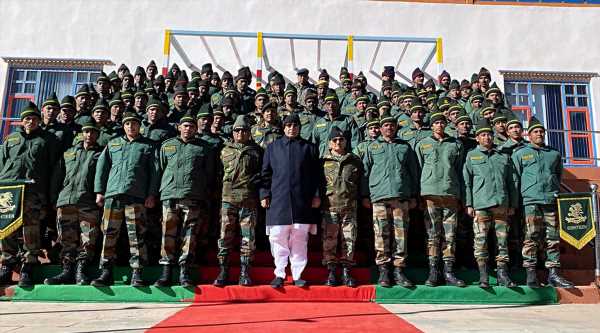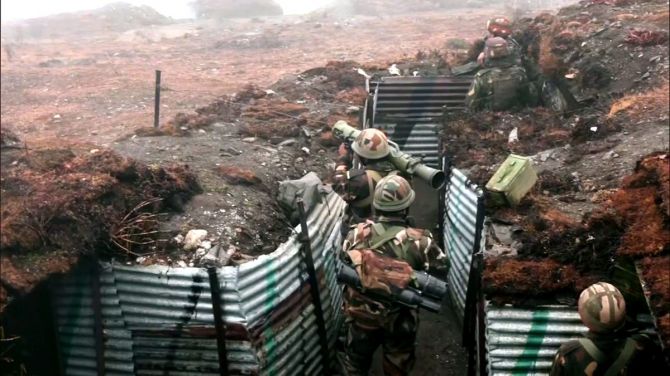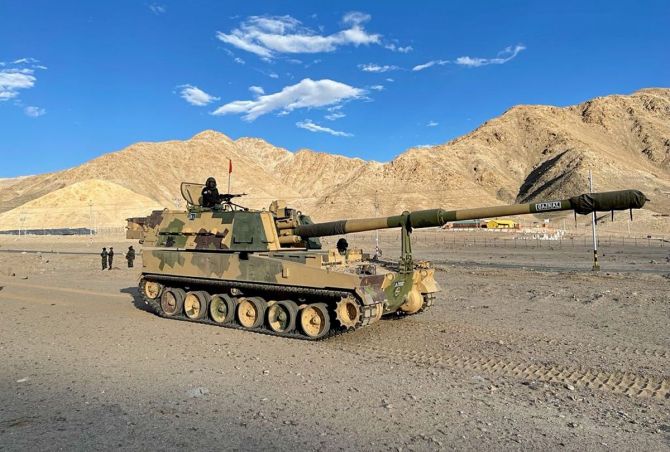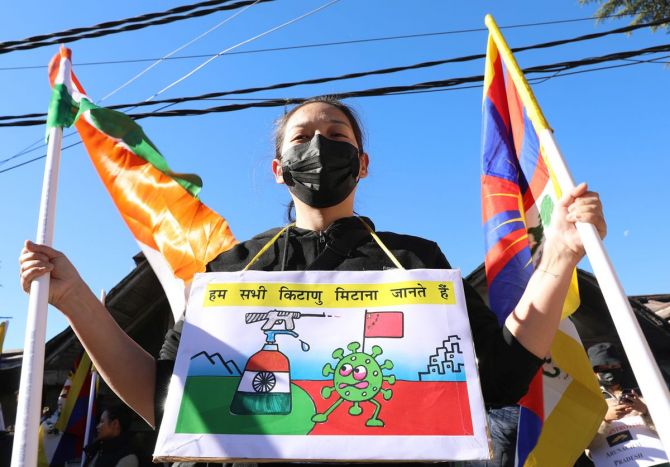‘There have been equal or more casualties on the Chinese side.’
‘Our soldiers are hardy and strong and far superior than the Chinese.’
“Lathi is not a soldier’s weapon. Soldiers are trained to shoot and kill, but managing the LAC is a sensitive issue. There are very clear instructions that we are not supposed to fire in a face off,” says Major General P S Behl [retired], former General officer Commanding of a division that had an operational role in Arunachal Pradesh.
A veteran of 36 years in the Indian Army, General Behl has served four tenures at the Line of Actual Control — from leading innumerable patrols as a young company commander to looking after operations of a corps as a brigadier to GOC of a division — he has had his boots on the ground in the rugged terrain of the eastern border with China.
In the second part of his interview with Rediff.com‘s Archana Masih, General Behl discusses the impact of the December 9 clash with the People’s Liberation Army, the difference between the LoC and LAC and the challenges encountered by Indian troops on the China border.
- Part 1 of the interview: ‘Chinese aggression has increased post Galwan’
What should India be watchful about after the December 9 clash with the PLA in Arunachal Pradesh? In your view, will there be a repeat of such incidents in times ahead?
Incidents do happen and will continue to happen. We are always prepared.
There have been equal or more casualties on the Chinese side. Our soldiers are hardy and strong and far superior than the Chinese.
The aggression as depicted by the December 9 incident shows that our troops were prepared and took on the Chinese.
Are our troops always on guard with batons, sticks or lathi kind of weapons to stave off any PLA violence?
Lathi or a stick is not a soldier’s weapon. Soldiers are trained to shoot and kill, but managing the LAC is a sensitive issue.
There are very clear instructions that we are not supposed to fire in a face off, where two parties meet midway, and we stop them from coming to our territory, and they stop us from going into their perceived territory.
At the same time, you need to carry some sort of device to ensure that the situation doesn’t escalate and they do not get harmed.
Is there a possibility that the cloud cover at that time could have rendered satellites ineffective to monitor PLA troop movements? In that eventuality, how do we track what the Chinese are up to them?
There are certain areas which will always be blacked out because of the cloud cover, but we have mechanisms on ground whereby we come to know what’s happening on the other side.
In this particular area, we are in a dominating position because we are on a height and are observing them.
A good attacker will always make use of situations like thick fog or bad weather. We will also do the same, but as I said, this is routine. It is known that they try to come in through these routes. Their intent is known and a mechanism is in place to counter them.
Is it the Chinese objective to keep the Indian Army on edge all along the LAC and make it a ‘live’ border like the Line of Control with Pakistan?
The LoC is a different story. The LoC can’t and shouldn’t be compared to the LAC. The LoC is ‘live’ when there is firing at each other from both sides. The Line of Control is a totally different ballgame where troops are eyeball to eyeball.
The LAC is by and large peaceful where incidents happen once in a while. However, each side peacefully goes up to its perceived LAC and dominates that area.
We patrol areas up to our perceived LAC and they do the same — this game will continue in the background of China’s claim on South Tibet.
We defend our areas and they do the same. We are generally not eyeball to eyeball in LAC, barring when the situation escalated in Galwan.
Troops on the LAC stay in the camps and patrol to a given area. So to compare the LoC with the LAC, firstly is not right. Secondly, these kinds of activities will continue and pressure will be maintained on India as they want to.
I don’t think the Chinese are interested in escalating the situation beyond a particular point. They know that we are much better prepared and it is not 1962 anymore.
Feature Presentation: Aslam Hunani/Rediff.com
Source: Read Full Article




